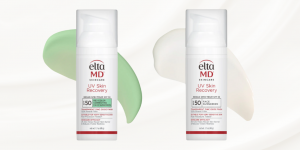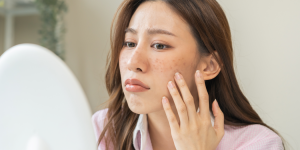Free Shipping Over $100
Free Samples With Every Purchase
Auto Replenishment Available
Authorized Reseller
Teen Skincare Do’s and Don’ts: A Simple Guide to Healthy Skin

In recent years, teens and adults have gotten easier access to skincare tips and product recommendations. It seems like every social media influencer is recommending a 15-step skincare routine to keep skin looking flawless. While some of their recommendations could be beneficial, they are simply too excessive for teen skin. Your teen may be tempted to add every trending skincare product to their routine, but most just need a simple skincare routine with a few, high-quality products to maintain healthy, balanced skin. Keep reading to learn teen skincare dos and don’ts.
Teen Skincare Don’ts: What to Avoid
Using an excessive number of products or the incorrect products are the two most common skincare don’ts. We’ll discuss how to cut back on excessive skincare products in the dos section below, but what about the incorrect products? One of the biggest skincare don’ts teens make is incorporating too many harsh skincare products or products that are designed for skin health concerns they simply don’t have. Specifically, teens don’t need to use the following skincare products:
- Vitamin C serums – most teens receive an adequate amount of vitamin C in their diets, and while it’s important to protect skin from sun damage at an early age, sunscreen provides a greater benefit against daily sun exposure compared with vitamin C serums that work best to prevent and reverse cumulative damage related to sun exposure.
- Hyaluronic acid – during the teen years, skin naturally produces an adequate amount of moisture. Hormonal changes during these years typically lead to oily skin. Hyaluronic acid acts as a sponge in the skin absorbing surrounding moisture and keeping it on your skin. Teenagers have plenty of hyaluronic acid in their skin, so applying more creates excessive moisture like a soaking sponge rather, making skin oily.
- Peptide serums – these products are designed to increase the production of collagen and elastin proteins, which diminish as we age. In the teen years, collagen and elastin are naturally produced in abundance, so peptide serums aren’t necessary.
- Retinols – retinols and prescription-strength retinoids are designed to boost skin cell turnover. They are often used to fight the signs of aging like fine lines and wrinkles or create an even, smooth skin tone and texture. Retinols can be very harsh, and there is a high chance that they will cause skin irritation. Most teens don’t need to use retinols, but those with acne and other skin conditions may. However, teen retinol use is only necessary if a dermatologist recommends it to address a specific concern.
- Chemical peels – for adults, a chemical peel helps to reset skin. Slower skin cell turnover can lead to uneven skin tone and texture, and chemical peels remove this outer layer of dead and damaged skin cells. Teens have faster skin cell turnover, and teen skin tends to be more sensitive. Chemical peels are unlikely to improve skin health, and they are much more likely to damage skin’s protective barrier and cause skin health concerns.
Teen Skincare Dos: The Basics
There are three words that summarize teen skincare dos – keep it simple. Most teens have relatively healthy skin. Unless they have a specific skin condition like acne or eczema that requires specialized care, teens can achieve and maintain balanced skin with just a few products applied consistently. A simple routine is enough to help your teen achieve their skincare goals, and they are more likely to maintain a simple routine. The most important thing for teens is to maintain their skin’s healthy, natural barrier. This ensures skin stays hydrated and reduces risk for skin inflammation, irritation, infection, and flareups in common skin conditions.
Below, we’ve outlined a good morning and evening skincare routine and a few of the best skincare products for teens:
AM Routine:
- Gentle cleanser – ALASTIN Skincare Gentle Cleanser calms skin and gently removes impurities for bright, balanced skin.

- Moisturizer (optional) – EltaMD Skin Recovery Light Moisturizer is a non-greasy, lightweight moisturizer that can be applied in the morning for teens who have dry skin. For those with combination skin, a lightweight moisturizer can also be applied directly to the areas that are dry.

- Non-comedogenic sunscreen – Colorescience No-Show Mineral Sunscreen SPF 50 offers broad-spectrum protection without chemicals. When properly applied, it won’t leave behind a white residue that may cause some teens to avoid applying sunscreen. It’s weightless, effective, and oil-free.
PM Routine:
- Gentle cleanser – if the ALASTIN Skincare Gentle Cleanser doesn’t work well, skinbetter Science Cleansing Gel is another gentle, effective cleanser option. It is formulated with skin soothing ingredients to calm skin.

- Moisturizer – ZO Skin Health Hydrating Cream is a light and oil-free moisturizer that is gentle and free from irritants and ingredients that may cause skin health issues.

Teen Skincare Tips for Maintaining Healthy Skin
Some basic tips when it comes to skincare for teens include:
- Avoid hot water – when cleansing, using hot water can strip moisture. Use cool or lukewarm water instead. This will remove grime and oil from skin without stripping away necessary moisture.
- Don’t scrub at skin – it can be tempting to scrub at skin, especially when dealing with acne or other skin conditions, this can cause unnecessary stress to skin. Instead, gently apply skincare products.
- Stop the pop – pimple popping videos may be taking over certain corners of the internet, but it’s truly not a good idea to pop or pick at pimples. It can lead to inflammation, irritation, and even skin infection. Instead, use spot treatments to shrink and heal blemishes.
- Make healthy choices – eat a nutrient-rich diet, drink plenty of water, exercise regularly, and sleep at least 7 hours a night. By maintaining a healthy body, teens can also improve skin health.
Guiding Teens to Their Ideal Skincare Routine
Simple, consistent skincare using high-quality products is the best way to ensure teens achieve and maintain their healthiest skin. While the recommendations in this blog offer good skincare options for most teens, everyone, at any age, has unique skincare needs. The best way to develop and maintain a good teen skincare routine is to work with a dermatologist. They will examine skin, review products, and make recommendations to improve your teen’s skincare routine. Forget the trendy skincare products and influencer’s 15-step skincare routine, focus on just the necessary items, and strive for consistency.
Explore More Dermatologist Recommended Skincare
Want to find dermatologist-recommended skincare products to meet your skin health goals or get more tips for all skin types? Take some time to explore the DermSkincare site. Don’t forget to come back to our blog regularly to get more product recommendations and skincare tips from our knowledgeable dermatologists.
















